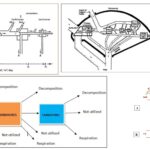IGCSE Biology 194 Views 1 Answers
Sourav PanLv 9November 14, 2024
Describe the importance of diffusion of gases and solutes in living organisms
Describe the importance of diffusion of gases and solutes in living organisms
Please login to save the post
Please login to submit an answer.
Sourav PanLv 9May 15, 2025
Diffusion is a vital process in living organisms, facilitating the movement of gases and solutes necessary for life. It plays a critical role in various biological functions, including respiration, nutrient transport, and waste elimination.
Key Roles of Diffusion
- Respiratory Gas Exchange:
- In animals, diffusion is essential for gas exchange in the lungs. Oxygen diffuses from the alveoli, where it is in higher concentration, into the bloodstream, while carbon dioxide diffuses from the blood into the alveoli to be exhaled. This process is crucial for cellular respiration, allowing cells to obtain oxygen for energy production and remove carbon dioxide as a metabolic waste product.
- Nutrient Transport:
- Nutrients such as glucose and amino acids diffuse from the bloodstream into cells. This passive transport mechanism ensures that cells receive the necessary substances for metabolism and growth. For example, after digestion, nutrients diffuse across the intestinal lining into the bloodstream .
- Waste Removal:
- Metabolic wastes produced by cells, including carbon dioxide and urea, diffuse out of cells into the bloodstream for transport to excretory organs. This process helps maintain cellular health by preventing toxic accumulation .
- Plant Functions:
- In plants, diffusion is vital for water and nutrient uptake from the soil through root hairs. Additionally, gases like oxygen and carbon dioxide diffuse through stomata in leaves, facilitating photosynthesis and respiration . The movement of water vapor out of leaves during transpiration also relies on diffusion.
- Cellular Homeostasis:
- Diffusion helps maintain homeostasis within cells by regulating concentrations of ions and other molecules. For example, sodium and potassium ions move across cell membranes through diffusion, which is essential for nerve impulse transmission and muscle contraction
0
0 likes
- Share on Facebook
- Share on Twitter
- Share on LinkedIn
0 found this helpful out of 0 votes
Helpful: 0%
Helpful: 0%
Was this page helpful?




